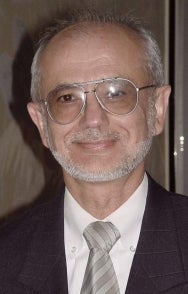Professor Farhad Mavaddat passed away on November 3, 2021 at the age of 80. Please see the in memoriam for our tribute to him and details about his personal and academic life.
His faculty profile has been preserved for historical interest.
 Research
interests
Research
interests

Professor Mavaddat received the BS degree in Electrical Engineering in 1963 from Tehran University, Diploma of Graduate Studies in 1964 from Philips International Institute of Technological Studies, Eindhoven, Netherlands, and DIC and PhD degrees in Computing in 1968, from Imperial College of Science and Technology, London, England. From 1968 to 1979, he was an Assistant and Associate Professor at Arya-Mehr University of Technology, Tehran, Iran, where he also served as the chairman of the Mathematics and Computer Science Department from 1975 to 1977. Since 1979, he has been an Associate Professor at the Department of Computer Science, University of Waterloo, Waterloo, Ontario, Canada. At both universities he helped to set up teaching and research laboratories for experimental computer science.
His present research interests include the design of large scale information systems, software systems, hardware/software verification, and system specification and codesign.
Professor Mavaddat has publications in areas of parallel processing, compilation, computer simulation, computer aids to VLSI design, transfer of informatics technology, and computer science education.
Over the last few years, he has been working on component-based software design and software-reuse, where he has been particularly interested in models of software components and computation models used in software composition.
Other areas of his current interest include commercial software components and web services.
Degrees and awards
BSc (Tehran), Diploma-Grad Studies (Netherlands), PhD, DIC (Imperial College)
Industrial and sabbatical experience
Oct. 1972 - Mar. 1973, Research Associate in Electrical Engineering (Fullbright Scholar), at Rice University, Houston, Texas.
Apr.-Sept., 1973, Visiting Scholar (Fullbright Scholar), Artificial Intelligence Lab., at Stanford University, Stanford, California.
Oct. 1977 - Sept. 1978, IBM Fellow, Pisa Scientific Centre, Pisa, Italy.
June 1, 1994 - May 31, 1995, VP Engineering, Ashtech Inc., Sunnyvale, California.
January 1999 - May 1999, Visitor, Embry-Riddle Aeronautical University, Daytona Beach, Florida.
Sept. 2000 - Sept. 2001, Visiting Associate Research Engineer, Electrical and Computer Engineering, at University of California, Berkeley, California.
Professor Mavaddat has over thirty years of work experience at various positions in academia and industry. Although the bulk of this experience is in the academic world, he has maintained a keen interest in commercial and industrial problems and priorities which is reflected in his research and teaching record.
Moreover, Professon Mavaddat has spent two sabbatical leaves in the industrial sector. The first sabbatical was taken at IBM Scientific Centre in Italy, where he worked on the initial development of a speech recognition system. The second sabbatical, acting as Vice President of Engineering, was spent at Ashtech Inc., where he helped the company to introduce modern design methods into their design and development process.
The nature and complexity of Ashtech products (Global Positioning System receivers) is a good reflection of his technical abilities and interests.
Representative Publications
F. Mavaddat and A. Arbab. Coordination through Channel Composition. Proceedings of 5th International Conference, Coordination, 2002.
F. Mavaddat, K. Sartipi, and K. Knotogiannis. A Pattern Matching Framework for Software Architecture Recovering and Restructuring. Proceedings of the IEEE International Workshop on Program Comprehension (IWPC), pp. 37-47, 2000.
F. Mavaddat, K. Sartipi, and K. Knotogiannis. Architectural Design Recovery using Data Mining Techniques. Proceedings of the IEEE European Conference on Software Maintenance and Reengineering (CSMR), pp. 129-139, 2000.
F. Mavaddat and H. Noori. Enterprise Integration Issues and Methods. International Journal of Production Research, 36(8):2083-2097, 1998.